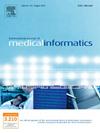急诊部门人工智能驱动的分诊:优势、挑战和未来方向综述
IF 3.7
2区 医学
Q2 COMPUTER SCIENCE, INFORMATION SYSTEMS
International Journal of Medical Informatics
Pub Date : 2025-02-15
DOI:10.1016/j.ijmedinf.2025.105838
引用次数: 0
摘要
急诊科(EDs)在提供即时护理方面发挥着至关重要的作用,通常面临着人满为患、资源限制和患者优先级变化的压力。传统的分诊系统虽然结构化,但依赖于主观评估,在高峰时间或大规模伤亡事件期间可能缺乏一致性。人工智能驱动的分诊系统提供了一个很有前途的解决方案,通过分析实时数据(如生命体征、病史和表现症状),自动对患者进行优先排序。本文综述了急诊科人工智能分诊系统的关键组成部分、益处、局限性和未来发展方向。方法本叙述性综述分析了2015年至2024年间发表的同行评议文章,这些文章通过PubMed、Scopus、IEEE Xplore和谷歌Scholar检索得到。研究结果进行了综合,以提供其潜力和局限性的全面概述。结果该综述确定了人工智能驱动的分诊的实质性好处,包括改善患者优先级,减少等待时间和优化资源分配。然而,诸如数据质量问题、算法偏差、临床医生信任和伦理问题等挑战是广泛采用的重大障碍。未来的方向强调需要改进算法,与可穿戴技术集成,临床医生教育和道德框架发展,以应对这些挑战并确保公平实施。人工智能驱动的分诊系统有可能通过提高效率、改善患者预后和支持高压环境下的医疗保健专业人员来改变急诊科手术。随着医疗需求的持续增长,这些系统代表了推进急诊护理和解决分诊中长期挑战的重要创新。本文章由计算机程序翻译,如有差异,请以英文原文为准。
AI-driven triage in emergency departments: A review of benefits, challenges, and future directions
Background
Emergency Departments (EDs) are critical in providing immediate care, often under pressure from overcrowding, resource constraints, and variability in patient prioritization. Traditional triage systems, while structured, rely on subjective assessments, which can lack consistency during peak hours or mass casualty events. AI-driven triage systems present a promising solution, automating patient prioritization by analyzing real-time data, such as vital signs, medical history, and presenting symptoms. This narrative review examines the key components, benefits, limitations, and future directions of AI-driven triage systems in EDs.
Method
This narrative review analyzed peer-reviewed articles published between 2015 and 2024, identified through searches in PubMed, Scopus, IEEE Xplore, and Google Scholar. Findings were synthesized to provide a comprehensive overview of their potential and limitations.
Results
The review identifies substantial benefits of AI-driven triage, including improved patient prioritization, reduced wait times, and optimized resource allocation. However, challenges such as data quality issues, algorithmic bias, clinician trust, and ethical concerns are significant barriers to widespread adoption. Future directions emphasize the need for algorithm refinement, integration with wearable technology, clinician education, and ethical framework development to address these challenges and ensure equitable implementation.
Conclusion
AI-driven triage systems have the potential to transform ED operations by enhancing efficiency, improving patient outcomes, and supporting healthcare professionals in high-pressure environments. As healthcare demands continue to grow, these systems represent a vital innovation for advancing emergency care and addressing longstanding challenges in triage.
求助全文
通过发布文献求助,成功后即可免费获取论文全文。
去求助
来源期刊

International Journal of Medical Informatics
医学-计算机:信息系统
CiteScore
8.90
自引率
4.10%
发文量
217
审稿时长
42 days
期刊介绍:
International Journal of Medical Informatics provides an international medium for dissemination of original results and interpretative reviews concerning the field of medical informatics. The Journal emphasizes the evaluation of systems in healthcare settings.
The scope of journal covers:
Information systems, including national or international registration systems, hospital information systems, departmental and/or physician''s office systems, document handling systems, electronic medical record systems, standardization, systems integration etc.;
Computer-aided medical decision support systems using heuristic, algorithmic and/or statistical methods as exemplified in decision theory, protocol development, artificial intelligence, etc.
Educational computer based programs pertaining to medical informatics or medicine in general;
Organizational, economic, social, clinical impact, ethical and cost-benefit aspects of IT applications in health care.
 求助内容:
求助内容: 应助结果提醒方式:
应助结果提醒方式:


